Related Research Articles

The Toronto International Film Festival is one of the largest publicly attended film festivals in the world, attracting over 480,000 people annually. Since its founding in 1976, TIFF has grown to become a permanent destination for film culture operating out of the TIFF Bell Lightbox, located in Downtown Toronto. TIFF's mission is "to transform the way people see the world through film".
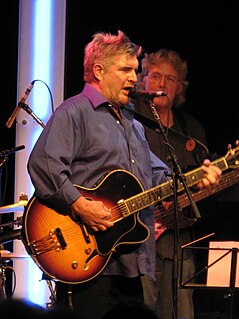
Paul Lewis Quarrington was a Canadian novelist, playwright, screenwriter, filmmaker, musician and educator.

Bruce McDonald is a Canadian film and television director, writer, and producer. Born in Kingston, Ontario, he rose to prominence in the 1980s as part of the loosely-affiliated Toronto New Wave.

A urinal is a sanitary plumbing fixture for urination only. Urinals are often provided in public toilets for male users in Western countries. They are usually used in a standing position. Urinals can be with manual flushing, automatic flushing, or without flushing, as is the case for waterless urinals. They can be arranged as single sanitary fixtures or in a trough design without privacy walls. Urinals designed for females also exist but are rare. It is possible for females to use male urinals with a female urination device.

Cinéfest Sudbury International Film Festival, also known as Cinéfest and Cinéfest Sudbury is an annual film festival in Greater Sudbury, Ontario, Canada, held over nine days each September. It is one of the largest film festivals in Canada.
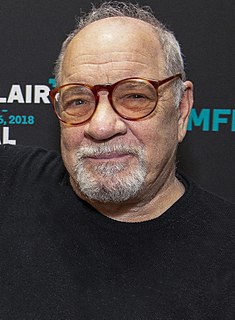
Paul Joseph Schrader is an American screenwriter, film director, and film critic. He first received widespread recognition through his screenplay for Martin Scorsese's Taxi Driver (1976). He later continued his collaboration with Scorsese, writing or co-writing Raging Bull (1980), The Last Temptation of Christ (1988), and Bringing Out the Dead (1999). Schrader has also directed 24 films, including Blue Collar (1978), Hardcore (1979), American Gigolo (1980), Cat People (1982), Mishima: A Life in Four Chapters (1985), Light Sleeper (1992), Affliction (1997), and First Reformed (2017); the latter earned him his first Academy Award nomination. Schrader's work is known for its frequent depiction of alienated men struggling through existential crises, a premise he dubbed "God’s lonely man."
John Greyson is a Canadian director, writer, video artist, producer, and political activist, whose work frequently deals with queer characters and themes. He was part of a loosely-affiliated group of filmmakers to emerge in the 1980s from Toronto known as the Toronto New Wave.

Barbara Jean Hammer was an American feminist film director, producer, writer, and cinematographer. She is known for being one of the pioneers of the lesbian film genre, and her career spanned over 50 years. Hammer is known for having created experimental films dealing with women's issues such as gender roles, lesbian relationships, coping with aging, and family life. She resided in New York City and Kerhonkson, New York, and taught each summer at the European Graduate School.
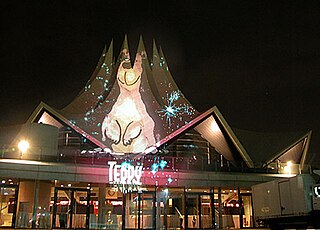
The Teddy Award is an international film award for films with LGBT topics, presented by an independent jury as an official award of the Berlin International Film Festival. In the most part, the jury consists of organisers of gay and lesbian film festivals, who view films screened in all sections of the Berlinale; films do not have to have been part of the festival's official competition stream to be eligible for Teddy awards. Subsequently, a list of films meeting criteria for LGBT content is selected by the jury, and a 3,000-Euro Teddy is awarded to a feature film, a short film and a documentary.

The 34th annual Toronto International Film Festival (TIFF) was held in Toronto, Ontario, Canada between September 10 and September 19, 2009. The opening night gala presented the Charles Darwin biography Creation. The Young Victoria, based on the early years of Queen Victoria, closed the festival on September 19.
Fig Trees is a 2009 Canadian operatic documentary film written and directed by John Greyson. It follows South African AIDS activist Zackie Achmat and Canadian AIDS activist Tim McCaskell as they fight for access to treatment for HIV/AIDS. It was also inspired by Gertrude Stein and Virgil Thomson's opera Four Saints in Three Acts. The film premiered at the 59th Berlin International Film Festival where it won the Teddy Award for Best Documentary.
Steven Markovitz is a South African film and television producer. He has produced, co-produced and executive-produced features, documentaries and short films. Steven has been producing and distributing for over 20 years. Since 2007, he has worked all over Africa producing documentary series' and fiction. He is a member of AMPAS, co-founder of Electric South & Encounters Documentary Festival and the founder of the African Screen Network.
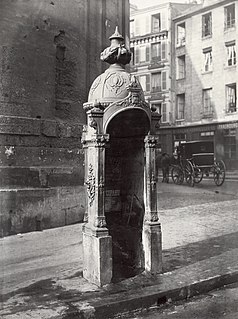
A pissoir is a French invention, common in Europe, that provides a urinal in public space with a lightweight structure. The availability of pissoirs aims to reduce urination onto buildings, sidewalks, or streets. They can be freestanding and without screening, with partial screening, or fully enclosed.

The 13th Toronto International Film Festival (TIFF) took place in Toronto, Ontario, Canada between September 8 and September 17, 1988. Midnight Madness programme was introduced at the festival. The festival screened more than 300 films from all over the world. Women on the Verge of a Nervous Breakdown by Pedro Almodóvar won the People's Choice Award at the festival, which later nominated for Best Foreign Language Film at Academy Award.

The 18th Toronto International Film Festival (TIFF) took place in Toronto, Ontario, Canada between September 9 and September 18, 1993. M. Butterfly by David Cronenberg was selected as the opening film.
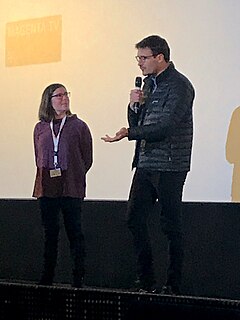
Kazik Radwanski is a Canadian film director and screenwriter. His early short films have been cited as part of the New Canadian Cinema movement. He made his feature film directorial debut in 2012 with Tower. His second feature film, How Heavy This Hammer (2015), screened at film festivals around the world and received critical acclaim. His third feature film, Anne at 13,000 Ft. (2019), starring Deragh Campbell, won the Toronto Film Critics Association's $100,000 Rogers Best Canadian Film Award in 2021.
The Toronto New Wave refers to a loose-knit group of filmmakers from Toronto who came of age during the 1980s and early 1990s.
The Making of Monsters is a 1991 Canadian short film, directed by John Greyson. Made while Greyson was a student at the Canadian Film Centre, the film's premise is that playwright and poet Bertolt Brecht is alive and living in Toronto, and actively interfering with the production of "Monsters", a heavily sanitized movie of the week about the 1985 death of Kenneth Zeller in a gaybashing attack.
International Dawn Chorus Day is a Canadian short experimental documentary film, directed by John Greyson and released in 2021. Taking its name from the observance of International Dawn Chorus Day, when people are encouraged to listen to birdsong, the film features the participation of 40 international filmmakers and artists who recorded birdsong for a Zoom call in tribute to deceased Egyptian activists Shady Habash and Sarah Hegazi.
References
- ↑ Paul Irish, "Filmmaker combines life with art". Toronto Star , June 18, 2009.
- ↑ M, P. "Urinal". TimeOut.com. Time Out Group Plc. Retrieved 2018-08-16.
- 1 2 Jay Scott, "From the strange to the sensational and back". The Globe and Mail , September 14, 1988.
- ↑ Urinal - Mubi , retrieved 2022-10-13
- ↑ David Overbey, "Canadian movies and makers the shakers of Berlin festival". Toronto Star , February 21, 1989.
- ↑ Aschenneller, Mabel (February 2009). "Queer Film Award at the International Film Festival Berlin" (PDF) (Press release) (Digital ed.). Teddy Award. Berlin International Film Festival. Archived from the original (PDF) on 17 March 2012. Retrieved 28 July 2019.